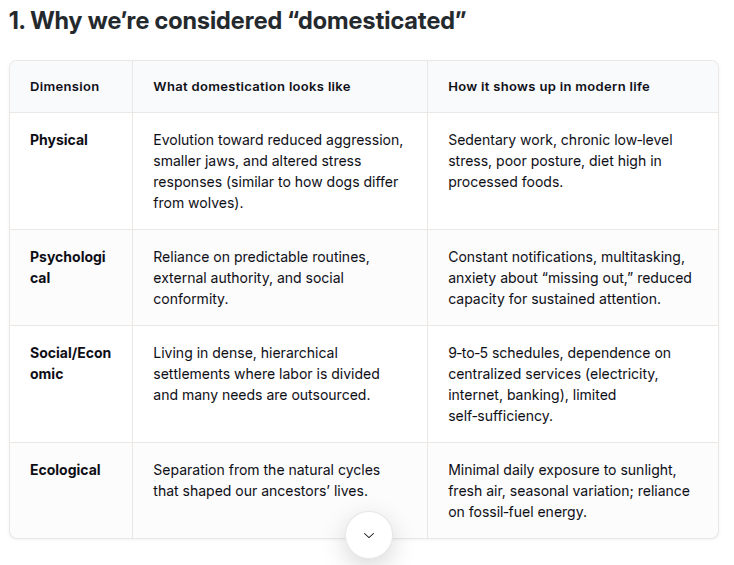Lumo, is there such a thing as a wild chicken?
The species most commonly recognized as the “wild chicken” is the red junglefowl (Gallus gallus). It is the direct ancestor of the domestic chicken (Gallus gallus domesticus). Red junglefowl still exist in forests and grasslands across India, Thailand, Malaysia, Indonesia, and surrounding regions.
… and …
When domestic chickens escape or are released into the wild and establish self‑sustaining populations, they become feral chickens. These birds are essentially domesticated chickens that have reverted to a wild‑like lifestyle*. Feral populations can be found in many parts of the world, from the Hawaiian islands to parts of Australia, the Caribbean, and even some U.S. states.
Okay. Is there such a thing as a wild human?
The short answer is no—modern humans don’t exist in a truly “wild” state the way many animal species do.
I was afraid of that.
While we lack a truly wild human population, anthropologists describe hunter‑gatherer societies as the closest analogues to a “wild” mode of life:
Subsistence: They obtain food by hunting, fishing, and gathering wild plants rather than farming or industrial production.
Mobility: Groups are often nomadic or semi‑nomadic, moving seasonally to follow resources.
Social structure: Small bands (typically <100 individuals) with egalitarian decision‑making and limited material accumulation.
Examples include the San of Southern Africa, the Hadza of Tanzania, and the Mbuti of the Congo Basin.
***
Thus the evidence about “what we should do about it” suggests that the answer is to move in the direction of hunting and gathering our food, becoming more nomadic, living in community, and becoming more wildlike.
Not because that will allow us to ‘Go Back Again’.
Rather simply because living wilder allows us to at least start the project of de-domesticating ourselves.
Also because it’s a better aesthetic.
I feel certain you won’t agree, but that’s okay too. Go with God or something … I will too.
***
Lumo, what does it mean to de-domesticate ourselves?
De‑domestication is a provocative way of describing a deliberate shift away from the habits, environments, and cultural patterns that have arisen because humans have been “domesticated” by our own societies. Below is a concise framework that captures what the phrase usually implies, why people talk about it, and what practical steps (and limits) it entails.

There’s pages and pages more like this, culminating in a list of practical sensible steps to take, written in a self-help style: “Wake with sunrise, spend the first hour outdoors doing light movement … End the day with a brief reflection journal on paper”; all of it aimed at de-domesticating/rewilding ourselves and …
Provided by an Artificial Intelligence.
Yes, Alice, I believe we’re on the other side of the looking glass, and Toto too.